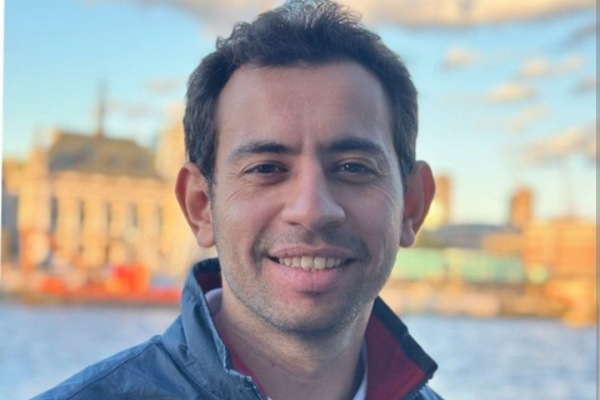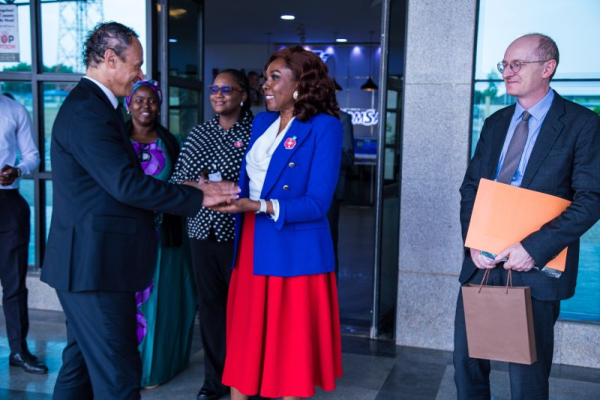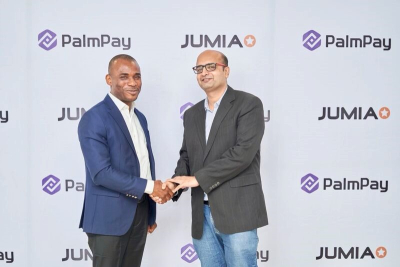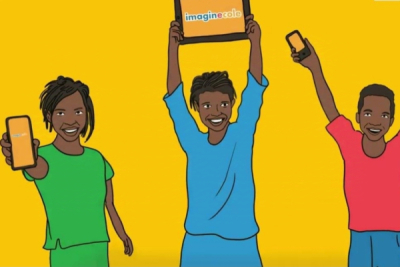A serial entrepreneur, he co-founded three technology companies. He specializes in providing innovative solutions across multiple sectors, with a particular focus on e-commerce.
Ahmed Gaber (photo) is an Egyptian computer scientist and tech entrepreneur. He is the co-founder and CEO of TradeHub, which connects manufacturers with local and international buyers.
Founded in 2023 by Ahmed Gaber and Ahmed Atef, TradeHub is a global online platform designed to help users discover and purchase a wide range of products from sellers worldwide. The initiative aims to simplify exports, streamline business operations, and enable local manufacturers to more easily access both domestic and international markets.
The platform offers several key features, including the ability for buyers to issue tenders, request quotes, and communicate directly with manufacturers. “At TradeHub is to revolutionize trade operations, aiming to empower 10,000 manufacturing companies by the end of 2024, making trade smoother and easier for everyone,” the co-founders said at the platform's launch.
Ahmed Gaber’s entrepreneurial journey began long before TradeHub. In 2013, he co-founded Join, a file-sharing app for smartphones that allowed users to exchange images and music in real time across multiple Android devices within groups. In 2016, he co-founded Bosta, an on-demand delivery company in Egypt. Using innovative technology, Bosta enables individuals and businesses to quickly send packages across the city. Today, Gaber serves on Bosta’s board of directors.
Ahmed Gaber earned a bachelor’s degree in computer and systems engineering from Alexandria University in Egypt in 2010. Recognized for his talent and contributions to technological innovation, he was named to the Forbes 30 Under 30 list for the Middle East in 2021.
By Melchior Koba,
Editing by Sèna D. B. de Sodji
The country aims to leverage international cooperation to advance its space technology program. In June, it signed an agreement with YahClick, a subsidiary of the Emirati company Yahsat, which specializes in providing satellite internet connectivity solutions.
Nigeria is seeking partnerships with France in the field of space technology, the Managing Director of NigComSat, Jane Egerton-Idehen (photo, center), said on Thursday.
During a meeting with French Ambassador to Nigeria Marc Fonbaustier (photo, left) on Wednesday, Egerton-Idehen expressed interest in leveraging French expertise to advance Nigeria's satellite goals.
Nigeria plans to acquire two new telecommunications satellites by 2025 to replace NigComSat-1R, which is expected to reach the end of its 15-year lifespan in 2026. In October, President Bola Tinubu approved the deployment of four new Earth observation satellites to enhance the country's capabilities.
“[...] Sharing expertise allows us to learn from global leaders, which in turn accelerates innovation.It also matters because it boosts the economy. Satellite technology has the massive potential to transform industries like agriculture, education, and healthcare. And finally, it matters because of its global impact. Advancements in space technology improve connectivity and sustainability for everyone,” read a statement on Egerton-Idehen’s Facebook page.
Nigeria has shown particular interest in leading space companies such as Eutelsat and Thales. Thales, through its subsidiary Thales Alenia Space, has collaborated with several African countries, including Egypt, for which it built the NileSat-301 satellite launched in June 2022. In October, Thales signed a memorandum of understanding with Moroccan company Panafsat to develop a satellite communications system. The company has also partnered with the Democratic Republic of Congo and Monacosat on satellite internet projects.
While France possesses the expertise to assist Nigeria, the meeting between Egerton-Idehen and Fonbaustier was primarily described as a "formal courtesy." No official agreements have been signed.
By Isaac K. Kassouwi,
Editing by Sèna D. B. de Sodji
The synergy between fintech and e-commerce can drive economic growth by supporting small businesses, creating jobs, and improving efficiency in consumer markets. The rise in mobile wallets and online payment platforms like PalmPay plays a vital role in driving this transformation.
Fintech platform PalmPay announced, on December 12, a strategic partnership with Jumia, Africa’s e-commerce giant. The partnership enables Jumia shoppers to use PalmPay as a payment method at checkout, providing a seamless and reliable transaction experience through direct integration with the PalmPay wallet. This integration marks a pivotal step in enhancing the convenience and security of online shopping in Nigeria.
We're proud to announce a strategic partnership between @palmpay_ng and @JumiaNigeria, bringing together the best of e-commerce and fintech to enhance the digital payment ecosystem in Africa.
— PalmPay Nigeria (@palmpay_ng) December 12, 2024
The PalmPay wallet is now directly integrated into Jumia's checkout process in… pic.twitter.com/3pl1xnIeSG
Sofia Zab, PalmPay's Chief Marketing Officer, said, “This strategic alliance aligns perfectly with our shared commitment to delivering a superior user experience and exceptional value to our customers.”
The collaboration represents the beginning of a long-term alliance between the two industry leaders. Together, they aim to drive innovation, increase convenience for consumers, and foster the widespread adoption of digital payments across Africa.
In 2023, Nigeria saw electronic payment transactions total N600 trillion, marking a 55% increase from N387 trillion in 2022, according to the Nigeria Inter-Bank Settlement System (NIBSS). This growth highlights the swift adoption of digital payment systems, fueled by rising smartphone usage, better internet connectivity, and fintech innovations. The surge in digital payments is also driving the rapid expansion of e-commerce platforms like Jumia.
This partnership highlights the growing synergy between fintech and e-commerce in Africa, showcasing a commitment to advancing the continent's digital economy while promoting financial inclusion and a cashless society.
Hikmatu Bilali
The digital age is transforming how public administrations operate. In response to these changes, countries are investing in advanced technologies to streamline their services and enhance their economic attractiveness.
Tunisia's customs authority on Thursday announced the "Nouveau système d’information douanier" (SINDA2), a strategic modernization initiative aimed at revolutionizing customs procedures. Scheduled for phased implementation starting in 2025, SINDA2 will integrate advanced technologies and promote a paperless environment.
"With SINDA2, we are introducing a system that simplifies processes, enhances economic competitiveness, and establishes more transparent and efficient customs management. This project is a critical milestone in our commitment to sustainable digital transformation," Abdelkrim Abidi, Director General of the National School of Customs, said in a statement.
Designed to encompass all customs procedures, SINDA2 will leverage advanced technologies to foster collaborative management between customs authorities and external partners. Key objectives include full digitization of documents, implementation of a risk management policy, and the promotion of a paperless workflow. A central feature of the project is interoperability with third-party information systems, which will strengthen interagency coordination and improve operational traceability.
This initiative aligns with Tunisia's strong performance in electronic administration, bolstered by previous digitization projects such as TUNEPS, the national online public procurement management system. According to the UN Department of Economic and Social Affairs (UN DESA) report, "E-Government Survey 2024: Accelerating Digital Transformation for Sustainable Development," Tunisia ranks first in North Africa and third continent-wide in online administration development, with a score of 0.6935 out of 1.
Through projects like SINDA2, Tunisia reaffirms its ambition to become a regional leader in digital transformation and modern governance.
By Samira Njoya,
Editing by Sèna D. B. de Sodji
The introduction of the e-Visa system is a pivotal step in Africa’s digital journey. It not only modernizes administrative processes but also signals the continent’s readiness to integrate more fully into the global digital economy, fostering greater international openness and economic development.
Chad has made a major stride toward administrative modernization and international openness with the launch of its electronic visa (e-Visa) system. The “eVisa.td” platform was officially unveiled on December 11 during a ceremony at the Direction Nationale de la Police in N’Djamena, presided over by the Minister of State and Minister of Finance, Budget, Economy, and Planning, Tahir Hamid Nguilin.
The e-Visa system simplifies the visa application process for travelers to Chad by digitizing procedures. Through the platform, available in French, applicants can create an account, complete an online form with personal and travel details, upload required documents, and pay the necessary fees. Once processed, visas are issued electronically.
This initiative is part of Chad’s broader efforts to modernize public services and enhance digital transformation. By streamlining international travel, the e-Visa system aims to boost Chad’s global appeal and attract more visitors, aligning with the Strategic Plan for Digital and Postal Development 2020-2030 (PSDNP). This ambitious roadmap underscores the government’s commitment to advancing the nation’s digital infrastructure and improving public services.
The e-Visa system also positions Chad as a more accessible destination, supporting its goals of fostering international engagement and promoting economic development through enhanced digital solutions.
Hikmatu Bilali
The digital transformation of education has become a priority in addressing the challenges of inclusion and quality in teaching. In Africa, innovative initiatives are reinventing pedagogical methods by incorporating technological tools tailored to local needs.
The Imaginecole project, launched by UNESCO to address the educational challenges posed by the COVID-19 pandemic, is entering a new phase. The initiative will now be managed by the Senegalese government and local education stakeholders, who are tasked with adapting it to the country's specific needs. This transition, marked by a dual workshop held in Dakar from December 9-13, reflects efforts to strengthen local capacity for integrating digital tools into education sustainably.
“We have reached a stage where we will hand over the project to Senegal. We have developed numerous training programs on digital tools, education, and even the use of artificial intelligence in classrooms. It’s time for national authorities to take the lead and continue this momentum,” said Idalina Ndiaye Rodriguez, regional coordinator for the Imaginecole initiative at UNESCO.
Designed to ensure continuity in education during crises, Imaginecole is a regional platform accessible in 11 Francophone African countries. It provides teachers and students with a variety of digital resources, ranging from educational comics to AI-driven tools. This initiative aligns with Senegal’s broader efforts to build an inclusive and effective education system. Notably, the country recently secured €70 million in funding from the Development Bank of Southern Africa (DBSA) to support the digital transformation of its education sector.
The transfer of Imaginecole is expected to modernize education in Senegal, making learning more interactive and accessible. The initiative also aims to boost student engagement, reduce educational inequalities, and position Senegal as a key player in the digital transformation of Francophone Africa’s education landscape.
By Samira Njoya,
Editing by Sèna D. B. de Sodji
Following his studies and several years of professional experience in France, he returned to his native Morocco. There, he provides businesses with IT solutions designed to streamline their operations.
Mhamed Harouchi (photo) is a Moroccan tech entrepreneur and the co-founder of ComptaCom Maroc, a company specializing in digital accounting. Established in 2022, ComptaCom Maroc empowers startups and very small businesses (VSEs) by providing access to an online accounting firm alongside a comprehensive management solution tailored to their needs.
The management software offered by the startup extends beyond accounting. It includes tax optimization, payroll management, and legal services. Additionally, ComptaCom Maroc provides Bleez, a cloud-based solution accessible anytime, anywhere. This innovative platform goes beyond billing and accounting to offer features like expense tracking and validation, online document storage, cash flow management, and document digitization. It processes and verifies all received documents while serving as a single point of contact for user inquiries and requirements.
Alongside his role at ComptaCom Maroc, Harouchi is a managing director at Ciel Informatique Maroc, a company that supports entrepreneurs and businesses by providing industry-specific software and expert assistance.
Harouchi’s educational background includes a master’s degree in civil engineering from the University of Technology of Compiègne (UTC) in France, earned in 2011. He also holds a master’s degree in real estate investment from Paris 1 Panthéon-Sorbonne, completed in 2012.
His professional journey began in 2012 at CBRE Global Investors, a U.S.-based investment management firm, where he served as a senior associate for the EMEA (Europe, Middle East, and Africa) region. From 2016 to 2020, he worked as a director at Colliers International Maroc, a real estate consultancy firm.
By Melchior Koba,
Editing by Sèna D. B. de Sodji
She creates engaging educational programs and creative projects that inspire children to become independent learners.
Gabi Immelman (photo) is a South African entrepreneur, learning designer, and educator. She is the co-founder and CEO of Mindjoy, a startup offering innovative learning solutions for students.
Founded in 2021, Mindjoy empowers students to take control of their own education while safeguarding their data privacy. The company leverages artificial intelligence (AI) to support learners in STEM fields (science, technology, engineering, and mathematics), enabling them to explore and solve problems at their own pace. This approach frees teachers to focus on areas where their guidance is most impactful.
Mindjoy provides students with access to a multimodal AI tutor capable of seamlessly integrating images, videos, and enriched text into lessons. This interactive system offers immediate and personalized feedback, accelerating the learning process and enhancing student engagement.
Before founding Mindjoy, Gabi Immelman launched Pukka School in 2016, an initiative focused on fostering children’s creativity. The program encouraged exploration, curiosity, and learning through play, giving children the freedom to develop their inventiveness.
Immelman holds a bachelor’s degree in dramatic arts, theater, and directing from Stellenbosch University, earned in 2012. In 2021, she completed a master’s degree in inclusive education innovation at the University of Cape Town.
Her professional journey began in 2013 as a production manager at Saartjie Botha, a South African entertainment company. In 2014, she became a director, teaching artist, and technician at the Palo Alto Children’s Theatre in the United States. The following year, she joined Modern Times Stage Company, an American theater company, as an assistant producer. In 2018, she was appointed head of learning and development at Maara House, a learning-focused school in South Africa.
By Melchior Koba,
Editing by Sèna D. B. de Sodji
Eyone, a Senegalese company specializing in digital healthcare, has raised $1 million to strengthen its position in the sector and expand across Africa.
The funding, announced on December 6, includes $855,000 from the Sonatel Group through its VIF (Véhicule d’Investissement et de Financement) fund and $145,000 from Banque Internationale pour le Commerce et l’Industrie du Sénégal (BICIS).
This funding will support Eyone’s plans to expand to other African countries, develop AI-powered medical solutions, and include more specialized healthcare professionals.
Digitizing cultural institutions has emerged as a critical priority for many nations seeking to preserve their heritage and enhance public access to knowledge. International collaboration is essential to support these modernization efforts.
The Democratic Republic of Congo (DRC) has requested France’s assistance to modernize and digitize its National Library. The project was presented by MP Léonard She Okitundu during a visit by French Ambassador to the DRC, Remy Maréchaux, to this library on Monday, December 9.
"Equipping the Democratic Republic of Congo, the largest Francophone country, with a modern National Library is crucial for promoting and preserving the French language within the framework of global linguistic diversity," said Léonard She Okitundu. He also emphasized the urgency of digitizing the institution to meet current demands, noting that French President Emmanuel Macron has previously shown openness to supporting this initiative.
This appeal aligns with the DRC’s ongoing digital transformation efforts under its National Digital Plan "Horizon 2025." The National Library, established in 1989 and a cornerstone of the country’s heritage, faces significant challenges due to its deteriorating state. Housing over 120,000 books and 700,000 historical black-and-white photographs, the library urgently requires digitization to prevent irreversible damage or loss from potential disasters like fire, which could jeopardize decades of conservation and cultural enrichment efforts.
Should discussions about funding, raised by Remy Maréchaux, come to fruition, digitizing the National Library would bring several notable benefits. It would safeguard historical documents against the ravages of time and improve accessibility by making them available on digital platforms, thereby reaching a wider and more diverse audience. Furthermore, this digitization would enhance the dissemination of Congolese knowledge and culture on a global scale.
By Samira Njoya
Editing by Sèna D. B. de Sodji
More...
He leverages blockchain technology to launch innovative products in the market. After contributing to the growth of several fintech companies, he founded his own startup specializing in financial technologies.
Carel van Wyk (photo) is a South African engineer and tech entrepreneur. He is the founder and CEO of MoneyBadger, a company specializing in financial technology.
Founded in 2021, MoneyBadger offers a platform that simplifies bitcoin payments, both online and at physical points of sale. The company’s ambition is to create a world where networks for information and value transfer transcend borders, leveraging a currency suited for the digital age.
MoneyBadger provides CryptoQR, a universal translation app that facilitates interaction with traditional point-of-sale systems while accepting cryptocurrency payments. The startup enables businesses and e-commerce merchants to easily integrate its solution into their software or shopping carts to accept cryptocurrency payments.
Before founding MoneyBadger, Carel van Wyk co-founded Luno in 2013, a company specializing in cryptocurrencies. Luno’s solutions allow individuals and businesses to securely store, buy, use, and understand cryptocurrencies like Bitcoin with ease and safety.
Carel van Wyk graduated from Stellenbosch University with a bachelor’s degree in electronics in 2008, followed by a master’s degree in augmented reality in 2010.
After his studies, he joined Bazooka Games, a video game publishing company, as Director of Software Development. Between 2012 and 2013, he worked as a software engineer at SnapScan, a fintech firm, and FireID, an organization that helps passionate and talented entrepreneurs create companies to solve major challenges. From 2019 to 2023, he worked as a software developer at KnowBe4, a tech company specializing in security awareness training and phishing simulation programs.
By Melchior Koba,
Editing by Sèna D. B. de Sodji
A serial entrepreneur with 14 years of experience in creating innovative startups across various industries, he has also worked with multiple incubators, supporting young entrepreneurs in launching and growing their ventures.
Simon Balemba Effansa(photo) is a Cameroonian computer scientist and tech entrepreneur. He is the founder and CEO of Fluide Finance, a digital bank dedicated to small and medium-sized enterprises (SMEs).
Founded in July 2024, Fluide Finance offers innovative solutions to simplify financial operations, enhance productivity, and drive business growth. The bank’s mission is to democratize access to efficient financial services by providing a comprehensive range of tools designed to help SMEs succeed.
Fluide Finance’s all-in-one platform centralizes several services: banking solutions for SMEs, business management tools (accounting, invoicing, customer relationship management), back-office support, and digital transformation consulting. This approach allows businesses to operate securely while optimizing their efficiency.
Simon Balemba Effansa is also a startup mentor at ActivSpaces, a tech incubator based in Cameroon. Before launching Fluide Finance, he co-founded Akwajobs in 2015, an online job platform where he served as CEO. In 2017, he created Healthy Lifestyle Foundation (HELIF), a multi-specialty healthcare organization he promoted. He graduated from the University of Buea with a bachelor’s degree in computer engineering and systems in 2013 and a master’s degree in operations, finance, and project management in 2018.
Between 2017 and 2018, he worked as a business development consultant at Makonjo Media, a marketing technology agency. In 2020, he joined Jongo Hub as a center manager.
From 2022 to 2024, he served as CEO of Bohikor, a fintech startup. Simultaneously, he worked as a business development consultant at Mountain Credit Union (MoCU), a digital credit cooperative, and as an enterprise architect at Iknite Space, a talent accelerator.
By Melchior Koba,
Editing by Sèna D. B. de Sodji
While many African countries express growing interest in e-government initiatives, securing domestic funding for these projects presents significant challenges. Diversifying funding sources at the continental level could offer a viable solution.
The West African Development Bank (BOAD) and the German development bank KfW recently launched the Digital Transformation Fund (DTF), designed to serve the West African Economic and Monetary Union (WAEMU) region.
The launch, in Lome, follows years of development, with the project initiated in 2020. Envisioned as both a financial and strategic tool, the DTF aims to support digitalization projects across the eight WAEMU member states.
The fund is dedicated to transforming public administrations through the modernization of technological infrastructure, the development of information systems, and the implementation of innovative digital solutions. Its flexible and scalable resources will be tailored to the specific priorities of each participating country.
"The DTF embodies our collective ambition to build modern administrations capable of effectively meeting the needs of our populations in an ever-changing world," said BOAD Vice President, Moustapha Ben Barka, when presenting the initiative at the launch event.
In Togo, the fund arrives as the country strives to enhance its digitalization efforts and modernize public services. In recent years, the Ministry of Digital Transformation, supported by the operational efforts of the Togo Digital Agency, has implemented significant reforms, including the digitization of numerous administrative services. The country aims to digitalize 75% of public services by 2025.
Ayi Renaud Dossavi
Demand for high-speed internet is surging as individuals and businesses increasingly rely on digital technologies. As service quality becomes paramount for addressing a range of challenges, upgrading telecommunications infrastructure has emerged as a critical strategic priority.
The Guinean government has completed an expansion of the national fiber optic backbone capacity from 50 to 200 gigabytes, the Ministry of Posts, Telecommunications, and the Digital Economy said on Monday.
The upgrade aims to improve internet service quality for Guineans. The backbone, the fiber optic network that transmits internet traffic across the country, can now handle significantly more data, potentially leading to faster connections and fewer slowdowns for users, especially during peak hours. This expanded capacity is also expected to support the delivery of high-speed internet services to underserved rural areas.
The work follows frequent consumer complaints about the quality of services provided by telecom operators, particularly voiced on social media. In September, Posts, Telecommunications, and the Digital Economy Minister Rose Pola Pricemou (photo) demanded urgent action from stakeholders to address "the concerning deterioration of network quality and internet speeds impacting the Guinean population" since the beginning of the year.
Improved service quality from this backbone upgrade could enhance the digital experience and unlock new opportunities for individuals and the broader community, according to the GSMA (Global System for Mobile Communications Association). However, efforts to broaden internet access across the population must continue.
As of June 30, 2024, the Guinean Postal and Telecommunications Regulatory Authority (ARPT) reported 6.6 million mobile internet subscribers, representing a penetration rate of 47.42%.
By Isaac K. Kassouwi,
Editing by Sèna D. B. de Sodji















